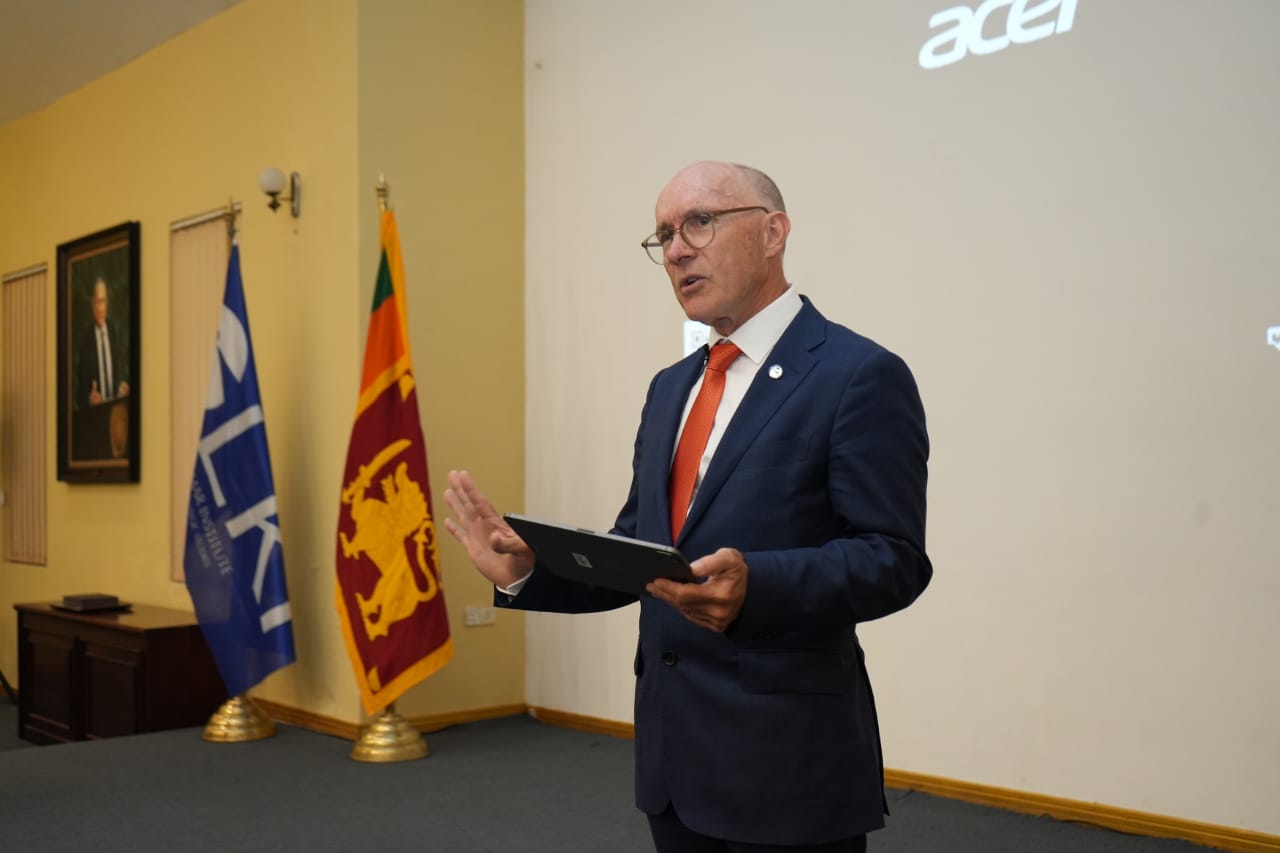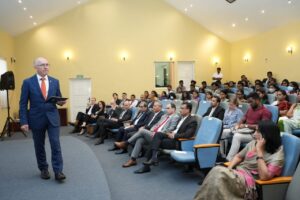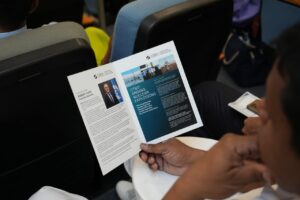June 1, 2023 Reading Time: 3 minutes

Reading Time: 3 min read
The Lakshman Kadirgamar Institute of International Relations and Strategic Studies hosted Dr. Robert Floyd, Executive Secretary of the Comprehensive Nuclear-Test-Ban Treaty Organization (CTBTO) for a special guest lecture on 1 June 2023.
Delivering the opening address Mrs. Aruni Wijewardena, Secretary, Ministry of Foreign Affairs welcomed Dr. Floyd and highlighted the important role played by CTBTO in building up the verification regime of the Comprehensive Nuclear-Test-Ban Treaty (CTBT) in preparation for the Treaty’s entry into force, as well as promoting the Treaty’s universality. She stated that the Test-Ban Treaty is a very unique treaty, comprehensively banning the testing of nuclear weapons and highlighted Sri Lanka’s role as one of the first signatories to the CTBT in 1996 and that Sri Lanka remains committed to achieve its objectives. She further stated that although the ultimate objective of the treaty, upon its entry into force, is to ban the testing of nuclear weapons, countries continue to benefit from the technological capacity building that is required for the extensive international monitoring established by the CTBTO. 
Dr. Robert Floyd commenced his lecture by paying tribute to the life and legacy of one of Sri Lanka’s most renowned diplomats, the late Ambassador Dr. Jayantha Dhanapala, who passed away on 27 May, 2023. He stated that the late Ambassador Dhanapala devoted his professional life to disarmament and peace, serving as the President at the NPT Review Conference in 1995, and as the Under Secretary General of the United Nations for the Office for Disarmament Affairs between 1998 and 2003.
Dr. Floyd explained that the Comprehensive Nuclear Test-Ban Treaty (CTBT) is a ban on all nuclear explosions regardless of whether they take place in the atmosphere, on or below the ground, or under sea. He emphasized that there are no exceptions to this. He stated that by banning this practice, the proliferation of nuclear weapons can be rendered impossible. Furthermore, he stated that the treaty also prevents vertical proliferation as countries would not be able to advance their existing nuclear weapons without appropriate testing.
Dr. Floyd stated that the CTBTO has been assigned the responsibility to establish the verification system for the treaty to enter into force, which as of today is over 90% complete and that they are confident that the highly sensitive verification system being established would be able to detect any form of nuclear testing. He noted that the seismic sensors in the Earth’s crust, hydroacoustic sensors in the oceans, and infrasound sensors in the atmosphere are able to detect the vibrations that result from nuclear testing. He noted that Sri Lanka hosts its own international monitoring station in Pallekele which feeds data to the CTBTO in Vienna and that this data is readily available to all signatories of the CTBT.
 He also stated that training and capacity building is provided for countries to analyze and understand the data to develop early warning systems for natural disasters such as tsunamis, earthquakes, volcanic eruptions and other climate change related disasters. Dr. Floyd also explained how Hydroacoustic sensors picked up whale songs that were triangulated to a location in the Chagos Archipelago which led to the discovery of a new sub-species of pygmy blue whales.
He also stated that training and capacity building is provided for countries to analyze and understand the data to develop early warning systems for natural disasters such as tsunamis, earthquakes, volcanic eruptions and other climate change related disasters. Dr. Floyd also explained how Hydroacoustic sensors picked up whale songs that were triangulated to a location in the Chagos Archipelago which led to the discovery of a new sub-species of pygmy blue whales.
Dr. Floyd noted that the CTBTO has also initiated a 1300-member youth pilot group to engage the next generation in continuing the progress made by the treaty thus far and that he remains hopeful that the treaty will gather the minimum ratifications required for its entry into force.
Dr. Floyd concluded his lecture by urging Sri Lanka to ratify the treaty as a fitting tribute to the legacy of the late Ambassador Jayantha Dhanapala.
The event was attended by members of the Diplomatic Corp, senior officials of the Ministry of Foreign Affairs and other ministries, representatives of the Sri Lanka Army and Navy and other distinguished invitees.